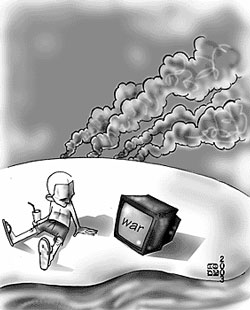
Illustration by Cody Angell
|
By Phil Leckman
Arizona Daily Wildcat
Monday March 24, 2003
It was exactly what a vacation should be. For three days of sun and sand, the incessant drum of the outside world ÷ the schoolwork, the jobs, even the looming threat of war ÷ faded to a dull background throb. Life felt carefree, which is an easy enough state of affairs when you intentionally limit your world to a tent and two miles of beautiful beach. This self-imposed exile from the world couldn't last, of course. News of the war crept in first, with school and bills and all the rest close behind. Now, just a few days later, the nastiness and stress of the real world is back with a vengeance.
But even the hectic back-to-school push can't quite shake that vacation mindset. Even now, I find myself fighting a temptation to block out the facts and stay blissfully ignorant just a little bit longer. Vacation dreams may not be realistic, but they are certainly intoxicating.
In many ways, the U.S. after Sept. 11 has a lot in common with a college student on his way back from the beach. Like spring-breakers, Americans have spent a long time watching the hard facts of the world pass them by. And both groups seem unable to accept that the vacation has come to an end.
Though Americans have been barraged with eyewitness exclusives and special reports this week, the most powerful war footage so far ÷ the images from the bombardment of Baghdad ÷ required no CNN commentators to make their impact. Thick black smoke billowed from dozens of burning buildings, and the streets of Iraq's capital thundered with the explosion of hundreds of tons of American ordnance.
The scenes from Baghdad were a terrifying testament to the horror of war. To Americans, however, they likely had little meaning beyond the TV screen. Before Sept. 11, no American city had faced bombardment or invasion since the close of the Civil War some 138 years ago. This stands in marked contrast to the rest of the world. In France or Germany, for instance, the grim days of World War II and its aftermath remain in the memories of millions of citizens.
With the exception of a comparatively small number of veterans and active military, Americans have no such memories. For over a century, war has been something that happens far away, in some distant corner of the globe. Insulated by distance, a poor awareness of geography and history, and a national media that relegates world affairs to the back pages, Americans have been free to devote themselves to other pursuits, like celebrity fashion or the latest Hollywood blockbuster. Like vacationers combating the specter of exams and papers with bottles of beer or games of beach volleyball, we shield ourselves from the complexities of a difficult and dangerous world under a sturdy shell of distractions.
The terrible events of Sept. 11 should have brought an end to this vacation. But Americans, like spring-breakers, have shown little enthusiasm for facing up to the hard realities the WTC disaster should have illustrated. While the subsequent "war on terror" has been driven by many factors, including a legitimate concern for national security, a chief motivator for many Americans seems, regrettably, to be the desire to get it all over with so we can once again turn our full attention to Britney Spears' love life.
Faced with the necessity of confronting global realities, most Americans just want to be back on vacation.
Nothing illustrates this better than the war on Iraq. Ignore, for the moment, the continuing prominence of the Oscars or the NCAA tournament at a time when our country is daily visiting death on hundreds of Iraqis. Even the war coverage itself demonstrates our nation's pathological fear of hard issues and complicated decisions.
Disregarding Middle East politics or the consequences posed by the President's decision to ignore the U.N., CNN, MSNBC, Fox News and all the rest have crafted a simple, easily digestible story, complete with good guys, bad guys, and lots of big explosions.
The TV coverage depicts a war of spectacles, narrated by intrepid camouflage-clad reporters riding on tanks, heading for a final triumphant showdown with the forces of evil. It hardly rates as informed news for an aware, critical public. As entertainment, though, it's heady stuff, another stirring story of American derring-do in a foreign land.
Here at UA, vacation is over and students are facing up to the realities and challenges posed by real life. The American vacation, however, shows no signs of ending. Not even war, it seems, can wake us from our slumber.

